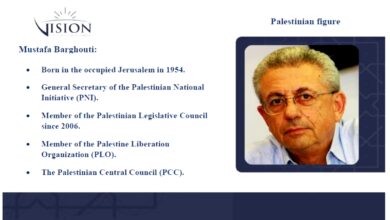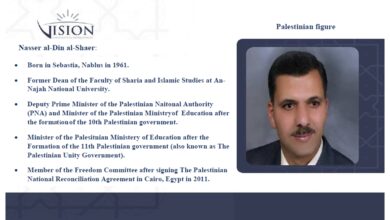Fadwa Barghouti
Fadwa Barghouti
Fadwa Mohammed Ismail Barghouti was born on May 15, 1963 in Kobar, a village in
northern Ramallah. She is married, with four children. She received her elementary
education at Kober Secondary Girls School, received her primary education at Al-Bireh
Primary School, and received her secondary education at Al-Bireh Secondary School for
Girls. She passed the secondary level, scientific stream, in 1982. She received her
diploma degree in Sciences and Mathematics from the Modern University College in
1985, received her bachelor’s degree in Law from Beirut Arab University in 1996, and
received her master’s degree in Civil Law from Al-Quds University. She opened an
office for legal services in Ramallah and started working there in 1999 – 2012.
Barghouti joined Palestinian National Liberation Movement (Fatah) while she was in
high school. One of her first political activities was forming the five-member committee,
which is a subcommittee of The Union of Palestinian Women’s Committees (UPWC), in
1982. Later, the five-member committee was called ‘The Association of Women
Committees for Social Work (AWCSW)’. She was following-up the affairs of 240
kindergartens in the West Bank, literacy programs and the sewing shops.
In 1987, she had to leave Palestine to be close to her deported husband Marwan
Barghouti. During that time, she was traveling from Jordan to Tunisia, vice versa. Once
she returned to Palestine in 1993, she went back to work again to activate the union. In
2016, she was chosen to be the chairman of the union. In 2007, she was chosen to be a
member of the Palestinian National Council (PNC). In 2009 and 2016, she was chosen to
be a member of the Fatah Revolutionary Council. It is worth mentioning that Barghouti
has joined the international campaign which demands freeing Marwan Barghouti and
Palestinian prisoners, who later on became its leader.
Barghouti participated in several meetings, symposiums, conferences, and workshops.
She appears frequently in Palestinian, Arab and international media just to talk about the
just case of her husband and the Palestinian prisoners. Currently, she is writing a
biography about herself, in which she documents her husband’s imprisonment and the
Palestinian prisoners’ hunger strike.
Barghouti believes that the Oslo Accords could have helped Palestine to be recognized if
Palestinians used it to their advantage. However, this did not happen due to the political
division and refusing accepting other’s political orientations. She also believes that this
division is affecting Palestinians negatively. It needs to end in order to reunite
Palestinians political parties together to fulfill their mission in mobilizing international
support. Furthermore, Barghouti believes that political partnership promotes democracy that
leads to the transparency of elections. In accordance to the terms of the charter of national
reconciliation, she states that this will promote people’s right to participate in political,
institutional and in the Palestine Liberation Organization (PLO) works. Barghouti
believes that the unity of the Palestinian people will defeat the strongest troops, let alone
the Israeli occupation. Consequently, they will be able to balance between politics and
resistance in accordance to the provisions of international laws. The Palestinian resistance
should be organized under the consensus of the Palestinian political parties. She finally
states that it would be preferable at this stage of the Palestinian resistance to be peaceful
to achieve its goals.



